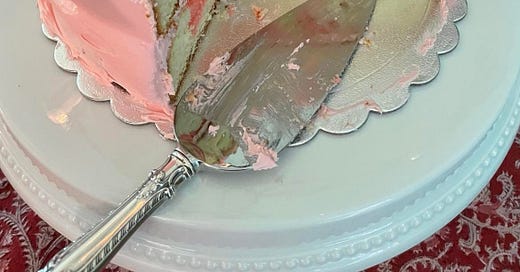“I don’t think there is going to be a blog this morning either,” says my spouse Janyce holding back the 48 pounds of our dog as she climbs and clambers over us. “There’s a wildebeest in the room.”
It’s Sunday and Janyce has joined me back in bed with her computer at 7:30. I opened the curtains on my way to start the coffee and only a weak gray light trickled into the room, the morning sun held hostage behind heavy cloud cover.
“Well that’s good, because I’ve got nothing to write,” I say.
“Yes, dear,” says Janyce, not looking at me.
“No, seriously. When I skip my Saturday morning writing day, something happens,” I say.
“Mmm, hmm,” she says.
I start and stop writing a bunch of times. I wonder about this phenomenon when I skip a workout day, too. I get out of my rhythm and routine even the slightest bit and it takes double the effort to get back in. The internet is full of headlines: “5 hacks to help you get back into your routine,” “Getting back into a routine when you've gotten off track,” “Getting back on track with habit stacking.”
The other night my son called me from Nashville while Janyce and I were making deviled eggs in the kitchen and prepping for the party on Saturday afternoon. “Honey, what’s wrong,” I said. I could tell from the sound in his voice after only his signature “Hey what’s up,” even though he was the one who called me. I stopped what I was doing to carry the phone with me into the bedroom. Turns out he was struggling with his anxiety, something he had been holding in check for months, even as he was excelling at new work challenges every day. “I haven’t been taking care of my mental health,” he said. “I’ve been on so many deadlines and so rushed that I’m not eating right, I’m not exercising. I don’t have time for my routines.”
We talked about strategies. Packing a lunch so he wouldn’t always eat the pizza they bring in for the sound crew; box breathing like the Navy Seals do, to calm him down before he got out of the truck in the morning; going out with his friends to get out of his head for a little while, even though his morning start was at 5am. Basically, he had to hack his brain a bit because he was telling himself an old story: that he couldn’t do it, that he didn’t know enough, that he wasn’t ready. None of these statements have any truth to them at all.
My mother was sitting in my kitchen yesterday. She looked pretty, wearing a sleeveless blouse with her hair newly done at the salon. “Your father gave me a lecture this morning,” she said. “He told me I was too negative and I’m too critical always about my myself.” “Well, I’m sure his delivery wasn’t the best,” I said. “But he isn’t wrong that we all need to talk nicer to ourselves.” Mel Robbins has taken this so far as to advise us all to actually high five our reflection in the bathroom mirror in the morning. It’s a bit hokey but I know that these brain hack things, if you do them, can actually work.
I listened to a podcast the other day during a long drive to attend a funeral. The subject was all about fructose and glucose and its effects on your body. The doctor who was speaking wrote a book called Nature Wants Us to Be Fat. I was fascinated by the talk so I listened to it twice. “Dr. Johnson explains how a simple mutation turned a simple sugar, fructose, ostensibly an energy source, into a metabolic poison that foments the chronic diseases that plague America and, indeed, the rest of the world,” read the comments on the back of the book jacket by Robert Lustig, MD, MSL, neuroendocrinologist at University of California, San Francisco.
It wasn’t lost on me that I was planning the menu for a special birthday party on Saturday. Sure, there would be flowers, poetry, even a few savory snacks spread out on the beautiful table. But the real star of this 80th tea party was a sugar-laden, pink-frosted birthday cake, and an assortment of tiny raspberry-filled petit fours, and buttercream frosted cupcakes and a pitcher of magenta-colored, ice-cold cosmopolitans. Sugar and more sugar. But see, frosted cake is one of the joys of my life. I’m not kidding you. I can’t imagine a celebration of any kind without it, especially not a milestone birthday, and I’m pretty big on birthdays, too. Still, I can’t deny the science telling me that it would be better if it held a slightly less pivotal spot in my life. The brain hack for me on this is to “habit stack” sugar to special occasions, thus taking it out of the normal daily diet rotation.
And this brings me back to the conversation I was having with my son the other night. Your brain can’t distinguish whether you have done something before or have just thought about it. It can’t tell whether you are an amazing accomplished audio engineer, or an accomplished writer, or a beautiful woman in the 7th or 8th decade of life. Janyce and I spent an afternoon with a small group of women, celebrating her mother, and each taking turns reading beautiful poems that spoke to each of us about how amazing we all are. And yes, eating some sugar. It’s all about balance.




